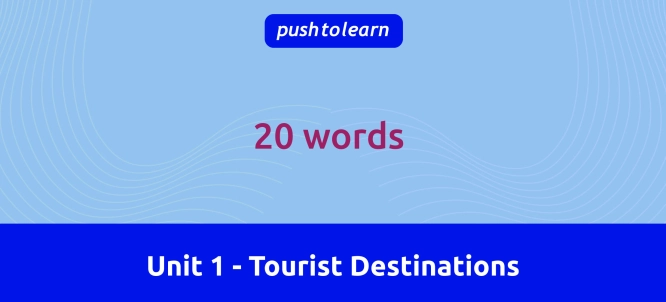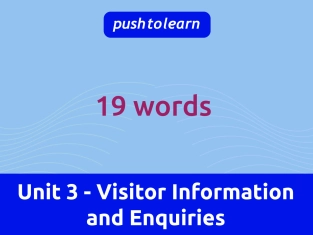by PushtoLearn
Unit 1 - Tourist Destinations
Table of Contents
Unit 1 - Tourist Destinations Exercises and Flashcards
These exercises focus on Unit 1 - Tourist Destinations, English for International Tourism Pre-intermediate
Vocabulary List for Tourist Destinations
Destination (noun)
Definition: A place to which someone is going or being sent.
Example: Paris is a popular destination for honeymooners.
Explanation: Knowing this word helps identify the final location in travel discussions.
Sightseeing (noun)
Definition: The activity of visiting places of interest in a particular location.
Example: Our itinerary includes a full day of sightseeing in Rome.
Explanation: This term is central to planning trips focused on cultural or historical attractions.
Guided Tour (noun)
Definition: A tour led by a person who provides information about the places being visited.
Example: We joined a guided tour of the Louvre to learn more about its history.
Explanation: This word is useful when discussing organized travel experiences.
Travel Agency (noun)
Definition: A business that arranges travel and accommodations for clients.
Example: The travel agency helped us book our flights and hotel.
Explanation: Knowing this term simplifies communication about travel planning services.
Inbound Tourism (noun)
Definition: Tourism involving visitors entering a country.
Example: Inbound tourism has boosted the local economy significantly.
Explanation: This concept is crucial in discussions about a country's tourism industry.
Outbound Tourism (noun)
Definition: Tourism involving residents traveling to other countries.
Example: Outbound tourism from the United States increased last year.
Explanation: It’s important for understanding international travel trends.
Domestic Tourism (noun)
Definition: Tourism within a traveler’s own country.
Example: Domestic tourism surged during the holidays.
Explanation: This term is relevant for promoting travel without leaving one's country.
Travel Brochure (noun)
Definition: A printed booklet that provides information about travel destinations and packages.
Example: The travel brochure included stunning photos of Bali’s beaches.
Explanation: Recognizing this term aids in understanding promotional materials.
Itinerary (noun)
Definition: A planned route or schedule for a journey.
Example: Our itinerary includes visits to three UNESCO World Heritage sites.
Explanation: Essential for organizing and discussing travel plans.
Package Holiday (noun)
Definition: A vacation arranged by a travel agency that includes transportation, accommodation, and sometimes meals.
Example: They booked a package holiday to the Maldives for their anniversary.
Explanation: Useful for understanding bundled vacation options.
Accommodation (noun)
Definition: A place to stay while traveling, such as a hotel or rental property.
Example: Our accommodation offered stunning views of the ocean.
Explanation: Critical for discussing where to stay during a trip.
Low Season (noun)
Definition: A time of year when tourism is at its lowest and prices are reduced.
Example: Visiting during the low season can save you a lot of money.
Explanation: Understanding this term helps with budgeting travel.
Peak Season (noun)
Definition: The time of year when tourism is at its highest and prices are elevated.
Example: Hotels are often fully booked during the peak season.
Explanation: Important for planning and avoiding crowded periods.
Day Trip (noun)
Definition: A journey completed in one day, without an overnight stay.
Example: We took a day trip to the nearby vineyards.
Explanation: Useful for short, spontaneous travel plans.
Travel Destination (noun)
Definition: A location selected for travel or vacation.
Example: Thailand is a popular travel destination for beach lovers.
Explanation: This term is broadly applicable in travel-related conversations.
Airport Transfer (noun)
Definition: Transportation service between an airport and another location.
Example: The hotel offers a complimentary airport transfer.
Explanation: Knowing this term is helpful for arranging convenient transportation.
Tourist Attraction (noun)
Definition: A place of interest that draws visitors.
Example: The Eiffel Tower is one of the most famous tourist attractions in the world.
Explanation: Central to identifying highlights of a destination.
Local Customs (noun)
Definition: The traditions and practices of the people in a particular area.
Example: Learning about local customs can help travelers avoid misunderstandings.
Explanation: Important for respectful and culturally sensitive travel.
Travel Insurance (noun)
Definition: A policy that provides financial protection for unforeseen travel issues.
Example: We purchased travel insurance to cover any potential cancellations.
Explanation: Crucial for safeguarding travel investments.
Visa Requirements (noun)
Definition: The legal criteria for entering a foreign country.
Example: Check the visa requirements before booking your trip to Japan.
Explanation: Essential for international travel planning.

Wordlist - Unit 1 - Tourist Destinations, English for International Tourism Pre-intermediate
|
Word |
Example |
|
destination |
Paris is a popular destination for tourists |
|
sightseeing |
They spent the day sightseeing around the city |
|
guided tour |
We booked a guided tour of the ancient ruins |
|
travel agency |
She works at a travel agency downtown |
|
inbound tourism |
Inbound tourism has grown significantly this year |
|
outbound tourism |
Outbound tourism declined due to travel restrictions |
|
domestic tourism |
Domestic tourism is encouraged during low seasons |
|
travel brochure |
The travel brochure highlights local attractions |
|
itinerary |
Our itinerary includes several famous landmarks |
|
package holiday |
They opted for a package holiday to Greece |
|
accommodation |
The hotel offers affordable accommodation |
|
low season |
Prices are lower during the low season |
|
peak season |
It's hard to find rooms during peak season |
|
day trip |
We took a day trip to the nearby village |
|
travel destination |
Thailand is a popular travel destination |
|
airport transfer |
The hotel provides an airport transfer service |
|
tourist attraction |
The Eiffel Tower is a major tourist attraction |
|
local customs |
It's important to respect local customs |
|
travel insurance |
Travel insurance is essential for international trips |
|
visa requirements |
Check the visa requirements before your trip |
FAQ
What is the difference between inbound and outbound tourism?
Inbound tourism refers to visitors entering a country, while outbound tourism involves residents traveling to other countries.
How can I avoid travel issues during peak season?
Plan and book early to secure accommodations, transportation, and activities. Consider traveling during the low season for a quieter experience.
Why is travel insurance important?
Travel insurance protects you from unforeseen events, such as medical emergencies or trip cancellations, providing financial security.
What should I include in an itinerary?
An itinerary should list transportation details, accommodations, key activities, and timeframes for each part of your journey.

